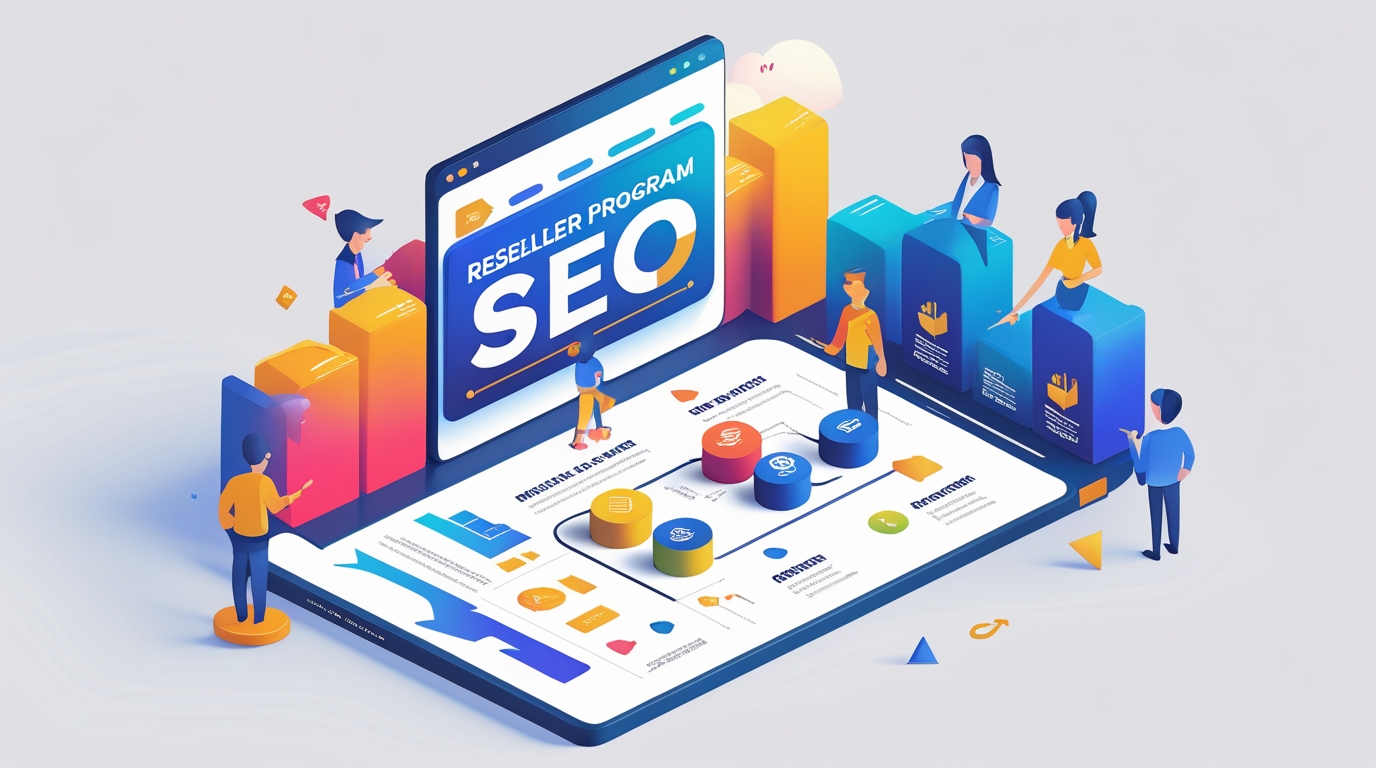Running an SEO agency means juggling client expectations, deadlines, and the constant rush to stay ahead of search engine updates. When your workload starts to outgrow the capacity of your current team, the instinct is often to bring new hires on board. However, hiring new staff can be costly and time-consuming. An alternative is a SEO reseller program—a partnership where you buy services in bulk and resell them to your clients under your own brand. This model allows you to expand your service offering, keep your billable hours high, and maintain the quality your clients expect—all without adding new people to the payroll.
Below, we break down how an SEO reseller program works, why it matters for agencies of all sizes, and how you can start leveraging this strategy today.
1. The Core Idea Behind Reseller Services
At its heart, an SEO reseller program is a simple reseller relationship: one company (the provider) delivers SEO work—such as keyword research, on-page optimization, content creation, or link building—to many agencies. The agencies buy these services at a discounted rate and resell them to their clients at a higher price, keeping the margin as profit. Think of it like buying a product wholesale and selling it retail.
What Makes It Different From Traditional Outsourcing?
- Brand Ownership: You keep your agency’s name on the client invoice and any deliverables.
- Control Over Scope: You decide which services to request and how many hours or pieces you need.
- Transparent Pricing: Most programs publish a clear discount structure, so you know exactly what you’re paying and what you can charge.
2. Why Agencies Love Reseller Programs
Cost Efficiency
Because the provider serves multiple clients, they can offer lower rates than a small agency could achieve on its own. This lower price point lets you compete for clients while protecting your margins.
Scalability
You can increase the volume of work for a particular client—say, adding more link-building campaigns—without needing to hire or train new staff. The provider’s team takes the load.
Focus on Core Strengths
Instead of spreading your team’s time across writing, outreach, and reporting, you can focus on client relationships, strategy, and growth. The technical heavy lifting is handled by the reseller.
Quick Onboarding
Since you’re not training new talent, you can close new deals faster, especially if you need to meet a tight deadline or launch a marketing campaign for a client.
3. Common Types of SEO Reseller Services
| Service | Typical Deliverable | Ideal Agency Use |
|---|---|---|
| Keyword Research & Site Audits | PDFs or dashboards | Quick wins for new clients |
| On‑Page Optimization | Updated page titles, meta descriptions, schema | Ongoing maintenance |
| Content Creation | Blog posts, pillar pages | Content-heavy campaigns |
| Link Building | Outreach emails, link placements | Authority building |
| Technical SEO | Site speed, mobile testing, crawl error fixes | Site health checks |
| Reporting & Analytics | Custom dashboards, KPI reports | Transparent performance tracking |
You can pick and choose or bundle these services based on what your clients value most.
4. How to Get Started: Step-by-Step
1. Identify Your Gap
- Audit your current workload: List the tasks that are taking up the most time or that your team consistently struggles with.
- Prioritize services: Decide which of those tasks could be outsourced to an agency partner.
2. Search for Reputable Reseller Partners
- Check credentials: Look for providers with proven case studies or client testimonials.
- Ask for samples: Request a sample audit or a snippet of a content piece to gauge quality.
- Review pricing: Make sure the discount margin aligns with your target profitability.
3. Negotiate a Discount Structure
- Volume-based discounts: The more you buy, the lower the per-hour or per-piece cost.
- Long-term commitments: Some partners offer better rates for yearly contracts.
- Flexibility clauses: Ensure you can pause or scale services as client needs shift.
4. Set Clear Service Level Agreements (SLAs)
- Timeline expectations: When will a keyword audit be delivered, or when will a content draft be returned?
- Quality benchmarks: Define what “high-quality” means—e.g., plagiarism-free, SEO-optimized, or meeting a certain word count.
- Communication channels: Identify who in the provider’s team will be your point of contact.
5. Integrate Into Your Workflow
- Project management: Use tools like Trello, Asana, or Monday.com to track tasks between your agency and the reseller.
- Document templates: Create standard briefs for the reseller to reduce back-and-forth emails.
- Client hand-off: Prepare a final deliverable package that looks like it came from your agency.
6. Monitor and Optimize
- Track performance: Compare the cost of the reseller service to the value it delivers.
- Solicit client feedback: Ensure the end product meets client expectations.
- Adjust sizing: Increase or decrease the amount of work per client as needed.
5. Building a Strong Client Relationship While Using Reseller Services
Keep Transparency
Clients appreciate honesty. If a service is outsourced, let them know that it’s from a trusted partner that maintains your agency’s quality standards. This builds trust and keeps them comfortable with the arrangement.
Maintain Brand Consistency
All deliverables—PDFs, emails, dashboards—should feature your branding. This reinforces that your agency is the point of contact and value provider, despite the behind-the-scenes partnership.
Offer Value-Added Extras
Use the time saved from outsourcing to deliver strategic insights, marketing consulting, or custom analytics dashboards. It’s the combination of technical work and strategic thinking that truly differentiates a boutique agency.
6. Potential Pitfalls & How to Avoid Them
| Pitfall | Why It Happens | Mitigation |
|---|---|---|
| Quality Drift | Less oversight leads to subpar work. | Set strict quality checks and review samples before full hand-off. |
| Hidden Costs | Unexpected fees or charge-backs. | Read the fine print; ask for a complete pricing breakdown. |
| Communication Gaps | Misaligned expectations between your agency and reseller. | Schedule regular check-ins and keep a shared project board. |
| Loss of Control | You might be surprised by deliverable format or timing. | Draft detailed briefs, include examples, and set clear SLAs. |
7. Real-World Example: From 30 to 120 Clients Without New Hires
Take the case of GreenWave Digital, a 12-person agency that had been stuck at 30 clients. They signed up for an SEO reseller services partnership for keyword research and content creation. Within six months:
- They added 90 new clients because they could deliver custom audits and articles faster.
- Their revenue grew by 70% while keeping staff at 12, cutting labor costs dramatically.
- Client satisfaction scores rose because the new clients received consistent, high-quality reports.
The key was that GreenWave used the reseller to handle the time-intensive, repetitive tasks, freeing their internal team to focus on strategy and client support.
8. How to Choose the Right Reseller Partner
| Criterion | How to Evaluate |
|---|---|
| Reputation | Look for reviews, case studies, and industry recognition. |
| Technical Expertise | Verify that they stay up-to-date with algorithm changes and white-hat practices. |
| Scalability | Ensure they can handle bulk orders without compromising speed or quality. |
| Cultural Fit | Check communication style, responsiveness, and shared values. |
| Pricing Transparency | No hidden fees, clear discount tiers, and straightforward invoicing. |
9. Final Thoughts: Scaling Smartly
An SEO reseller program isn’t a magic bullet, but it’s a powerful tool in the agency growth playbook. It lets you:
- Keep your brand front and center.
- Offer a broader suite of services.
- Preserve top-line growth without the overhead of new hires.
- Stay nimble in a fast-moving industry.
Instead of hiring a full-time content strategist or link-builder, you can tap into an established provider’s expertise. The result is a more efficient operation and a stronger value proposition for your clients.
Takeaway Checklist
- Audit your workload to spot outsourcing opportunities.
- Find a reputable reseller with clear pricing and SLAs.
- Negotiate volume discounts that fit your profit goals.
- Integrate seamlessly into your project workflow.
- Maintain brand consistency on all deliverables.
- Monitor quality and client feedback continuously.
By following these steps, you’ll be able to scale your agency’s service offering, keep your team focused on what they do best, and meet more client needs—all while staying profitable.
Good luck growing your agency the smart, scalable way!


